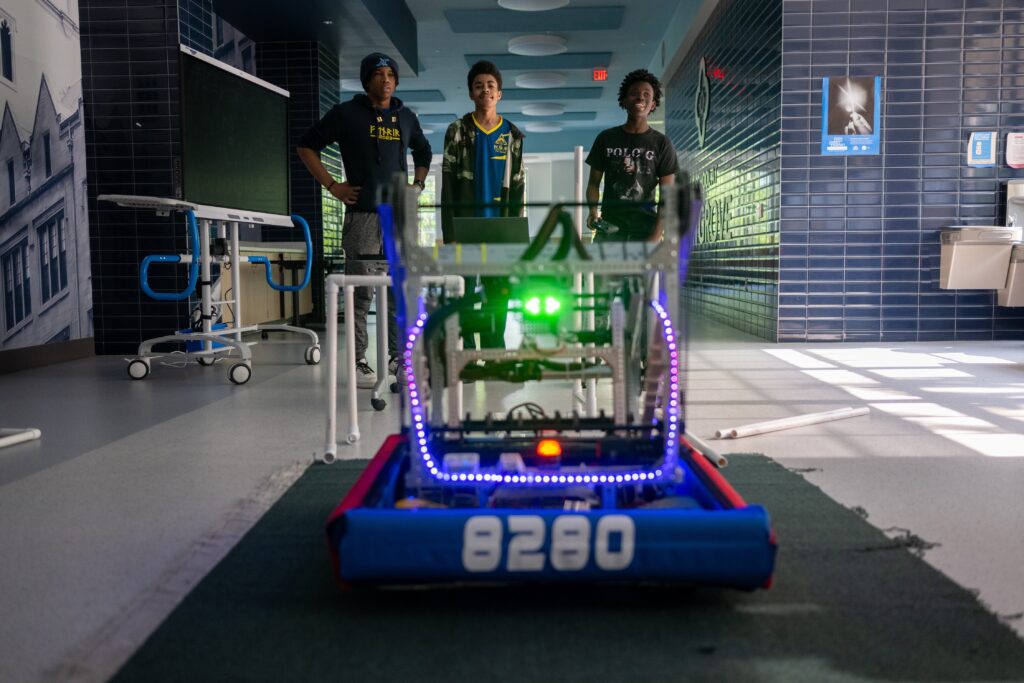Source: Michigan News
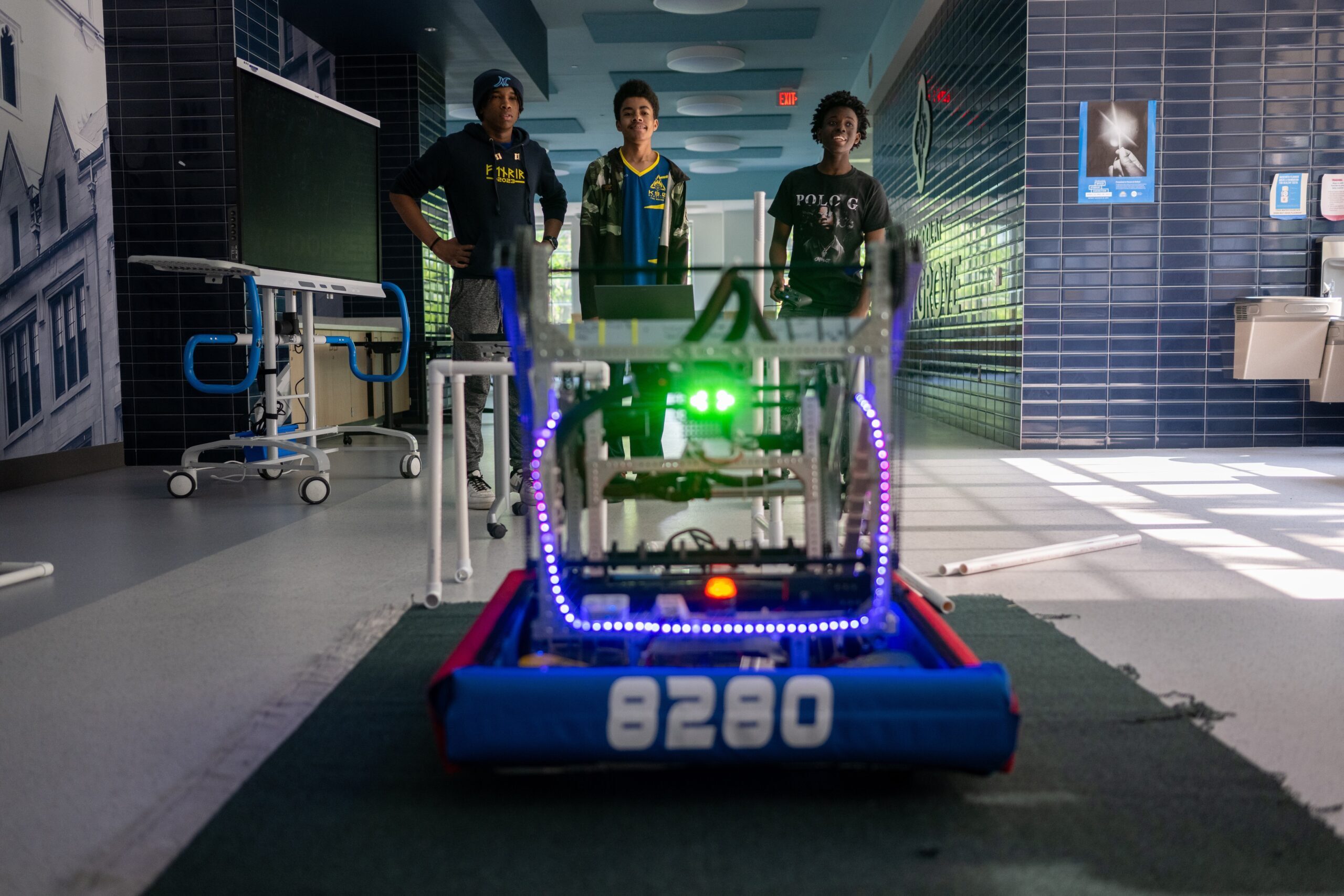
Building robots at the School at Marygrove, Detroit. Credit: Eric Bronson, Michigan Photography.
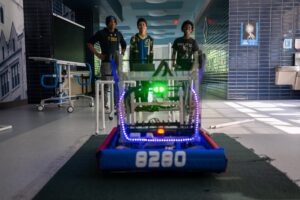
Building robots at the School at Marygrove, Detroit. Credit: Eric Bronson, Michigan Photography.
Amara Small had already spent 11 years working on coding and building robots when she joined the robotics team at the School at Marygrove in her junior year.
“I’ve been super into that since I was really young, because it’s like a sport really,” said Small, whose mother is an engineer. “And that’s so much different from building robots at your house. It’s very competitive and the hands-on work is a lot more rigorous.”
She credits team coach Leon Pryor for expanding her coding language and developing her into a team player.

Amara Small joined the robotics team at the School at Marygrove in her junior year. She credits coach Leon Pryor for expanding her coding language and developing her into a team player.
Credit: Eric Bronson, Michigan Photography.
“He’s great at guiding you through a problem without telling you ‘this is the answer,'” Small said. “The ability to be able to develop as an engineer, the ability to fully wire a robot from scratch or fully build a robot, like cutting with power tools, designing the robot, and being able to code a full robot from scratch with an autonomous mode, these are all super valuable skills that a lot of us didn’t have.”
Pryor, a University of Michigan alum and a senior game producer at Meta, got involved in robotics competitions when his son, at the time an elementary schooler in the Detroit Public Schools system, competed in a FIRST (For Inspiration and Recognition of Science and Technology) Robotics Competition in 2018. He noticed that other teams seemed to have more support. Since then, he’s led two youth robotics teams to success.
Pryor helped create the Motor City Alliance, a 501c3 that works with more than 100 metro Detroit elementary and middle school teams to help them compete and win national robotics competitions.
“Now we’ve more than doubled the number of state qualifying Detroit teams,” he said. “I like to say our mission of the alliance is to change the culture of STEM in Detroit, and we’re starting to see that.”
The Motor City Alliance had its first team—Detroit’s FLICS School team—go to the World Championship in Houston earlier this year.
And what an impression that made on team members.
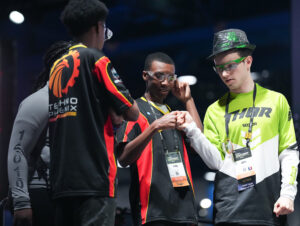
Student Tyre Ramey, center, said the experience competing in Houston was memorable and fun “being able to be a part of a robotics community.” Photo by Elizabeth Conley, special to Michigan Photography.
“When I saw all these teams at the World Championships in Houston, it inspired me to continue doing robotics,” said student Tyre Ramey. “It was a very fun and memorable event. I think if Mr. Pryor and the team weren’t here, then I think people would miss out … on being able to be a part of a robotics community.”
More than a thousand students have benefited from Pryor’s support and coaching so far. He coaches team 14010 TechnoPhoenix, the FIRST Tech Challenge team at Detroit’s Foreign Language Immersion and Cultural Studies School, or FLICS, as well as the FIRST Robotics Challenge team at the School at Marygrove, team 8280 K9.0 Robotics.
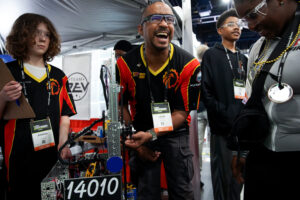
Leon Pryor, a University of Michigan alum and a senior game producer at Meta, got involved in robotics competitions with his son in 2018. He led Detroit’s FLICS School team to the World Championship in Houston earlier this year. Photo by Elizabeth Conley, special to Michigan Photography.
FIRST Robotics is a program where school teams design and build robots to compete in an annual contest. Each team is given a basic robotics kit, but it’s up to them to decide how to approach the design and what components to use.
Pryor said exposing kids early to STEM and problem solving will help them fit into the future economy and jobs landscape.
Michigan will see more than 16,000 job openings in STEM fields annually through 2028, according to a recent report of long-term employment projections from the state’s Bureau of Labor Market Information and Strategic Initiatives.
“There’s a time where you could have a manufacturing job and make six figures and do really well,” Pryor said. “Well, those things have shifted because of automation and things moving offshore. We have to train our kids for 21st-century jobs.”
Being on the robotics team isn’t easy. In the span of 10 to 12 weeks, students do the equivalent of a 500-level engineering course that starts with giving them a difficult problem.
“They’re not given any instructions, any guidance. They don’t have enough resources to get it done,” Pryor said. “It’s kind of like real life. The kids that can successfully navigate that are set up for any career in any field.”
Tymon Ray, whose son, Ryan Ray, is on the robotics team at Marygrove, said he was impressed with how Pryor made the team’s culture a top priority.

Tymon Ray, whose son Ryan Ray is on the robotics team at Marygrove, said he was really impressed with how Pryor made the team’s culture a top priority. “It’s teamwork. It’s being on time. It’s helping each other out…”
Credit: Eric Bronson, Michigan Photography
“It’s teamwork. It’s being on time. It’s helping each other out. It’s sacrificing for the team. It’s doing your part. Even if you’re not as involved, be a cheerleader for your team,” Ray said. “So those are just a few things, but I think those are pretty important. And I think those carry over into life, period.”
Michigan has more robotics teams than football teams with 533 FTC teams in the state, and just 3% of the 7,000 active teams in the world can qualify for the World Competitions.
“And we’re in that top 3%,” Pryor said.
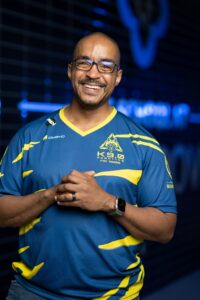
U-M alumnus Leon Pryor.
Credit: Eric Bronson, Michigan Photography.
The administration at Marygrove has created a maker space for Pryor’s FRC team, allowing the students to build within the school. The team originally built robots at the College of Engineering’s Michigan Engineering Zone at the U-M Detroit Center. The MEZ continues to support the team and collaborates with Pryor and the Motor City Alliance and the Marygrove K9.0 Robotics, said Haley Hart, the MEZ director.
FLICS principal Zetia Hogan said the robotics program helps students build critical thinking skills.
“The young scholars in this generation, I feel like they’re so open to the use of technology that it can be an influx into the STEM field like we’ve never seen before,” she said.
And while Pryor hopes students will go on to college and stick with STEM fields, if they don’t, they will at least acquire important skills for life.
“So while I really do enjoy this work, and I love seeing the kids grow, the social implications of this are not lost on me,” he said. “We are actually making some fundamental changes for the better for a lot of families in Detroit. And that just feels like a worthy goal to me.”

